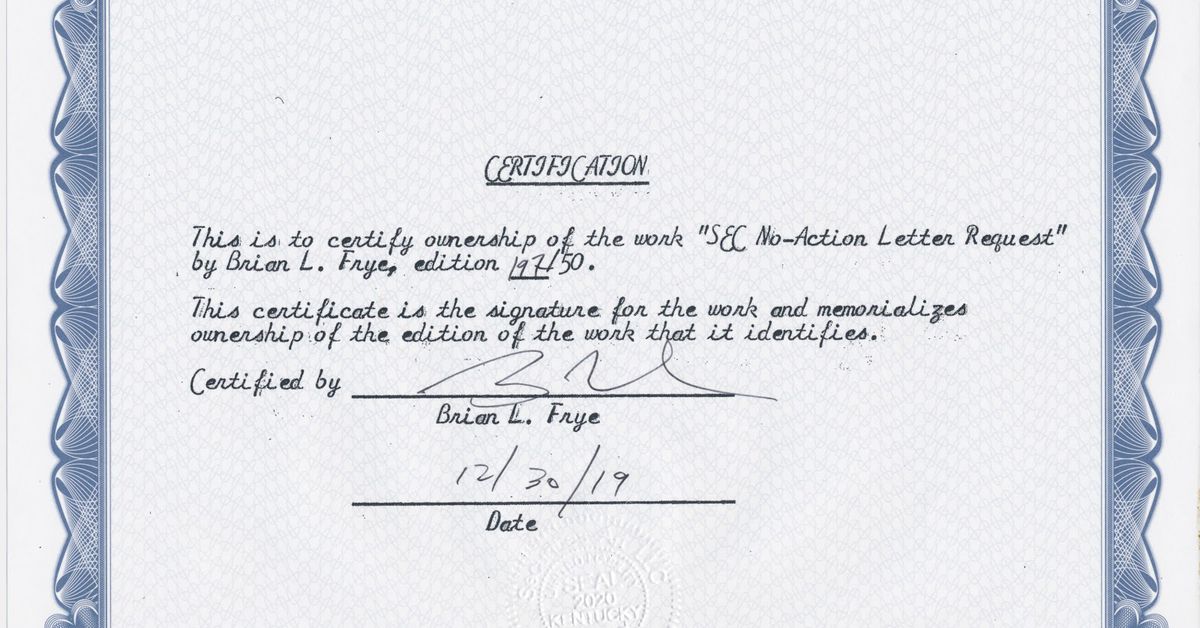Brian Frye, a conceptual artist, film maker and law professor, encourages people to plagiarize everything he’s ever created or said.“I’m the legal

Brian Frye, a conceptual artist, film maker and law professor, encourages people to plagiarize everything he’s ever created or said.
“I’m the legal academy’s leading plagiarism advocate. I’m also the legal academy’s only plagiarism advocate, which makes it very easy to be number one,” the bespectacled Frye said in a video call yesterday. Well, professor, I’m stealing that joke.
This article is part of CoinDesk’s Policy Week, a forum for discussing how regulators are reckoning with crypto (and vice versa). A version of it published first in The Node newsletter, which you can subscribe to here.
This pro-plagiarism stance is part of Frye’s continuing campaign against copyright, the legal instantiation of the idea that ideas can and should be owned. Over the past decade and a half, Frye has written countless legal reviews and op-eds discussing how copyright is antiquated in a world where the internet eliminates the costs associated with reproduction and distribution.
“Ideas are non-rival,” he told CoinDesk. “You don’t need to value them because there’s no scarcity, so they should be valueless.”
This contrarian opinion has brought him to the world of non-fungible tokens (NFT), the blockchain-based technology often credited with bringing “scarcity” to digital goods. It’s an idea for which lots of people are willing to pay big bucks.
A representative example: Ether Rocks is a series of virtual pet rocks that “live” on the Ethereum blockchain. There are 100 unique tokens – each corresponding to a near-identical cartoon JPEG – that even the creators say serve “NO PURPOSE” beyond speculation. Though the original image was a royalty-free piece of clip art, some people have spent millions of dollars on these tokens.
But, as Frye notes, what people are buying when they buy any NFT is “worthless.” By and large, NFTs do not represent ownership of the digital goods to which they supposedly correspond, do not confer copyright and may, in fact, one day be classified as securities. “So the owner of the NFT gets nothing other than the right to claim ownership of the NFT,” he wrote in August.
That’s not nothing. In fact, Frye is learning NFTs have a lot going for them. For one, there’s a sort of community-wide acceptance that people can sell even things they don’t possess. He sold an NFT of the Brooklyn Bridge for $500 – stealing the idea from an infamous scam artist.
NFTs are the “reductio ad absurdum” of contemporary art markets, meaning they reduce the “concept of ownership to its purest essence, it’s the ownership of ownership,” he said, and of art to pure market functions. Art, he said, has always been more about status than anything, and the blockchain just makes this pecking order more visible and open.
Further, NFTs are a sort of blunt instrument to wield against legacy institutions. In September, Frye minted a series of NFTs tied to a paper he wrote called “SEC No-Action Letter Request,” which raised the question of whether selling shares of ownership in the paper is an illegal unregistered security.
There was the implicit promise of income, which, to his surprise, actually came through. He brought in tens of thousands of dollars worth of ETH in the sale. This proved his thesis: The project called into question standing securities law, which Frye thinks is overly-broad in covering “any investment in a common enterprise that generates profit from the efforts of others,” and lays out a possible argument the SEC could use against him.
Read more: Some NFTs Are Probably Illegal. Does the SEC Care?
It’s easy to call everything meaningless: Art, securities rules, copyright. As part of a series we’ve called “Gensler for a Day,” which is asking informed and influential people to give their ideal crypto policies, CoinDesk reached out to see if Frye has any concrete plans, not just concepts. It’s not too far out there: Frye did once run for public office.
What follows is a condensed version of our conversation, covering NFTs, the SEC and the merits of writing while taking a bath. You can read a full version on CoinDesk.com. And feel free to steal his ideas.
“Break a contemporary museum into pieces with the means you have chosen, collect the pieces and put them together again with glue.” [That’s a line from Yoko Ono’s poetry book “Grapefruit,” which Frye has cited as inspiration.] Does that mean anything to you?
The idea is to just give people something to think about when they think about what they’re doing and why they’re doing it, you know, and also to do it by kind of ostentatiously plagiarizing someone else at the same time. All my good ideas are stolen from someone else.
Is that what you’re doing with NFTs?I mean, I think so. I’m not sure what I’m doing in NFTs, yet. When the NFT thing first hit the public consciousness over the summer, somebody called me from Business Insider and wanted me to talk about what was going on….
www.coindesk.com
